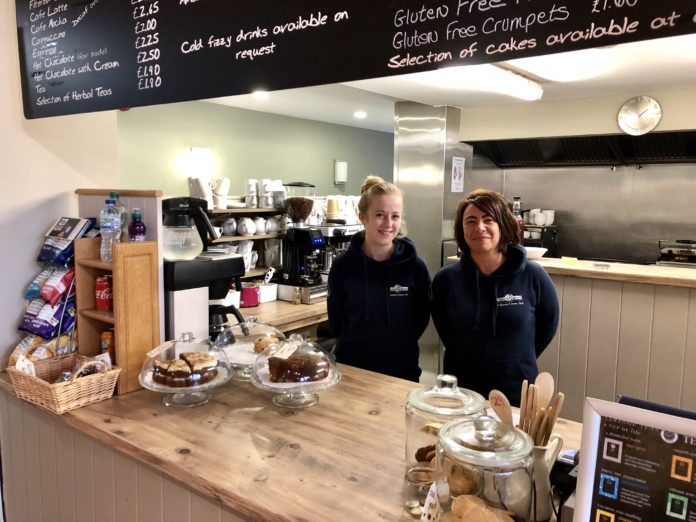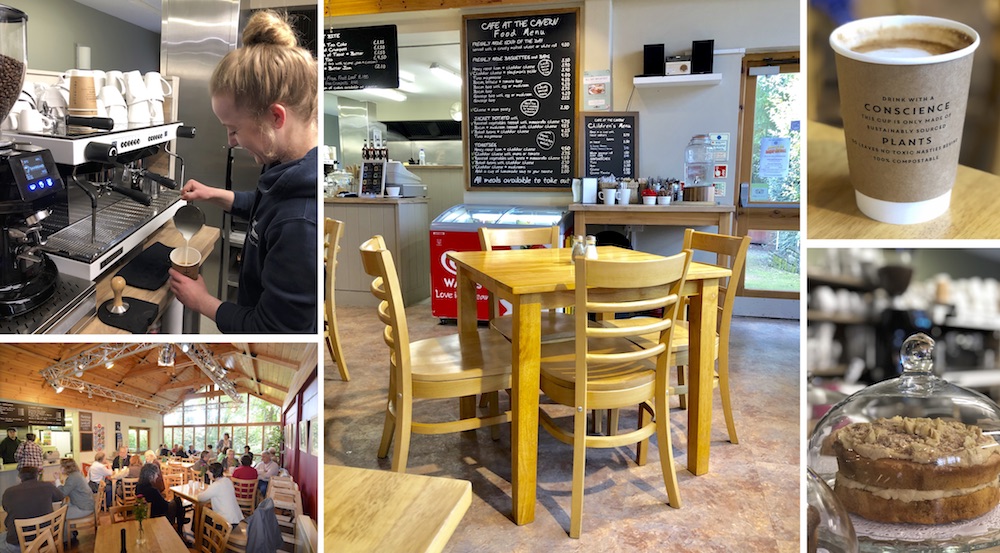Palm oil has become big news lately, making the headlines on a regular basis, mainly due the devastating impact palm oil plantations are having on orang-utans. Indonesia is the world’s largest producer of palm oil – the problem is, Orang-utans are found only in the rain forests of the Southeast Asian islands of Borneo and Sumatra and we’re losing them at an alarming rate.
With many of us still unaware of how palm oil production is wreaking havoc for Orang-utans, one Buxton business has decided to try to go palm oil free to try to highlight the issue. Poole’s Cavern & Buxton Country Park, owned and managed by Buxton Civic Association is no stranger to doing it’s bit for the environment but Hattie, who works in the café at the popular attraction, wanted to look at how the business could contribute to more global issues affecting the planet and for her it was a no brainer. “I researched food sustainability for my final year dissertation at the University of Derby and it was then the whole topic of palm oil was beginning to pop up in the news more and more. Then when I started looking at what it was doing to rain forests – and specifically Orang-utans, I was horrified, I had no idea it was so serious”.
Having worked at the café since graduating in 2016, Hattie reflected on her research at university and last year she started looking more closely at products the cafe use in their kitchen and in the food and drink products they sell.
Hattie is now trying to find ingredients and food stock for the café that are either palm oil free or use sustainable palm oil. But it’s not that easy, as she explains, “Palm oil is in so many products we use everyday, it’s so hard to avoid. Once you start looking at what it’s used for, it’s staggering – margarine, chocolate, ice cream, pizza dough, packaged bread, crisps and peanut butter, for example. It’s hard to know from the labelling whether there is palm oil in the product and if it is, whether it’s sustainable”.
“Palm oil isn’t just used in food either, it’s used in toiletries such as soap, shower gel, shampoo and lipstick as well as detergents such as washing powder and cleaning products, it’s literally everywhere”.
Why is Palm Oil considered to be so bad?
To make way for palm oil plantations, huge areas of rainforest are cleared or burned down. In Indonesia alone, an area the size of a football pitch is lost every 25 seconds. 85% of palm oil is produced in Indonesia and Malaysia.
Orang-utans spend most of their lives in trees. High in the forest canopy they can live long, peaceful and complex lives and have relationships that are really similar to humans.
Bornean orang-utan numbers have more than halved between 1999 and 2015, mostly due to the expansion of palm oil plantations. When a forest is cleared to make way for palm oil, orang-utans are left without a habitat. Worse still, some are brutally killed.
The Bornean orang-utan is listed as Critically Endangered and numbers are approximately 55,000. The Sumatran orang-utan, also Critically Endangered, has a population of around 14,600. In the last 16 years alone it is estimated that over 100,000 Bornean orang-utans have been lost.
It’s not just orang-utans being affected either. Sumatran tigers are also heavily at risk of extinction; as well as being poached by hunters, deforestation in Borneo and Sumatra is reducing their numbers.
WWF say Palm oil is now in half of all packaged products on supermarket shelves and to avoid it completely would be incredibly tricky. Although palm oil in food can no longer be described simply as vegetable oil and must be clearly labelled (thanks to an EU directive in 2014), there is no such law for products such as soap, shampoo and other cosmetics. The supermarket Iceland’s decision to ditch palm oil from all of its own-brand products was, it says, a response to the palm oil industry’s catastrophic failure to halt deforestation and deal with the problem.
“Palm oil comes in various guises on labels – Vegetable Oil, Vegetable Fat, Palm Kernel, Palm Kernel Oil, Palm Fruit Oil, Palmate, Palmitate, Palmolein, Glyceryl, Stearate, Stearic Acid and many more. We need to take responsibility as businesses and stop pulling the wool over our eyes. It’s easy to turn off the TV or not read a paper about things happening so far away. Businesses use palm oil because its cheap, so if we can use less of it as consumers and businesses, it’s a start”, explains Hattie.
“We could realistically lose Orang-utans forever within 25 years if we continue producing palm oil at the same rate and demand for it’s use in products remains high. Cheap production cost doesn’t help; growing demand for palm oil have placed pressure on palm oil-producing countries like Indonesia to rapidly expand their plantations and ramp up their production processes and to do this means clearing vast areas of precious rain forest – the orang-utans’ home”.
The café recently introduced biodegradable cups for drinks, so if you bring your own coffee cup – there’s 10% off the price of a hot drink. They also use wooden cutlery, not plastic in the cafe.
What is Palm Oil?
Palm oil is a type of vegetable oil found in the fruit on palm trees. These trees are mostly grown on plantations in Indonesia and Malaysia.
What is sustainable palm oil?
Sustainable palm oil is palm oil that is grown and certified against the 8 RSPO (Roundtable on Sustainable Palm Oil) principles and criteria. These stringent sustainability criteria relate to social, environmental and economic good practice. In a nutshell, sustainable palm oil does make businesses profitable while not harming people or the environment. One of the most important RSPO criteria states no primary forests or areas which contain significant concentrations of biodiversity (e.g. endangered species) or fragile ecosystems, or areas which are fundamental to meeting basic or traditional cultural needs of local communities (high conservation value areas), can be cleared. Other RSPO principles stipulate a significantly reduced use of pesticides and fires; fair treatment of workers according to local and international labour rights standards, and the need to inform and consult with local communities before the development of new plantations on their land.
What can you do?
Check your labels. Chester Zoo have produced a sustainable palm oil food shopping list so you can check for your favourites. “Purchasing power is the way forward and no matter how small a contribution you think you’re making, if we all make a small change, we can collectively make a big difference. We need to start somewhere.”
If you want to know and learn more – the WWF (World Wildlife Fund) website have many resources on there website. The RSPO website also provides a good reading resource.
Poole’s Cavern & Buxton Country Park, Green Lane, Buxton, SK17 9DH
T: 01298 26978
Did You Enjoy This?
You might like our regular newsletter. We put all the best events, cultural highlights and offers from Buxton and the Peak District in your inbox every month.
This information will only be used to send you this newsletter. It is stored in Mailchimp.















